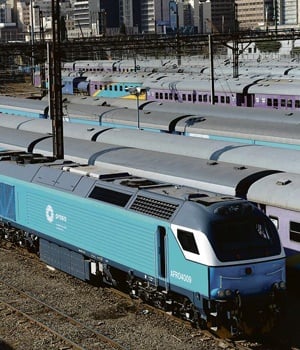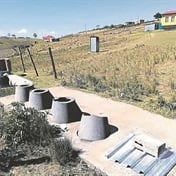
The Passenger Rail Agency of SA (Prasa) and Transnet are working together to fix what would have potentially been a hazardous situation caused by Prasa ordering locomotives beyond the permissible safe clearance height to avoid electrical overhead wires on local railway lines.
Sources close to the process say the two state-owned rail companies have already adjusted some of the overhead electrical wires on key routes to allow the new Afro 4000 locos to pass safely beneath them.
But it seems the Afro 4000s will no longer be used on at least one of the routes they were originally intended to run on.
Rapport revealed in July that Prasa – under the leadership of the now axed CEO Lucky Montana and “Dr” Daniel Mtimkulu – its discredited former head engineer who was outed as having lied about his qualifications – had purchased the diesel locos from Spanish manufacturer Vossloh España, despite warnings that they were too tall for local railway lines.
The standard roof height for trains in South Africa is 3.96m, while the Afro 4000 is 4.14m high.
A clearance of 15cm between any rolling stock and the overhead wires on the country’s 3 KiloVolt (kV) electrified lines, and a 30cm clearance on the 25kV lines, is imposed to mitigate the risk of electrocutions.
According to emails and documents in which Prasa’s new locomotives are discussed by both Transnet and Prasa engineers, the Afro 4000s would encroach into these clearance areas and pose significant safety risks on some of the routes they were supposed to run on.
The parastatals are now “making the best” of the situation by adjusting some of the contact wires, the sources say.
Rapport this week asked Prasa for clarity on where such problem spots were located, what it would cost to make the necessary adjustments to the overhead wires and how long it would take.
Sipho Sithole, Prasa’s chief strategy officer and acting spokesperson, confirmed that “there are ongoing discussions with Transnet Freight Rail ... aimed at addressing outstanding testing and commissioning issues in order to agree on the operational introduction of the Afro 4000”.
He said Prasa was “not in a position to provide the requested information [around the cost of the adjustments and the locations of the affected contact wires] at this stage, as this is part of ongoing discussions with Transnet Freight Rail”.
The discussions are “part of the normal process between the two parties when new rolling stock is introduced to the network”, maintained Sithole.
Transnet Freight Rail this week refused to comment on its work with Prasa on the locomotives.
In July, its spokesperson, Sandile Simelane, said: “Transnet Freight Rail has bilateral agreements with Prasa on a range of issues, including network sharing, and others. The two companies engage on a frequent basis on any matter that affects us in whatsoever way through the designated channels and forums established between the companies.”
But the emails in which the parastatals’ engineers discussed the introduction of the Afro 4000 on some of the intended routes paint a different picture.
The use of the Afro 4000 on the rail line between the Pretoria station and Pyramid North, some 25km to the north of the city, was “a risky operation” because “the heated exhaust gas gets discharged so close to the live wire”, reads one email.
A second email explains the problems the Afro 4000s would encounter if they were used on the Pretoria-to-Polokwane route.
The stretch of 45km between the Pyramid North station and Pienaarsrivier in Limpopo has eight locations where the clearance between the Afro 4000’s roof and the contact wires would be less than 25cm on this 25kV line.
“The Pyramid North to Pienaarsrivier clearance problem for the Afro 4000 is even worse than [on the] Pretoria to Pyramid North [line],” reads the email.
Prasa did not comment on the mechanical problems already experienced by two of the 13 Afro 4000s that had so far been delivered to the rail agency.
Rapport revealed in July that Afros number 4005 and 4013 were already experiencing problems with their bearing housings.
A letter from Vossloh to Prasa mentioning the “bearing housing issue” encountered on these two locomotives provided instructions on how to haul the locos from Cape Town to Johannesburg, seeing “as Prasa [doesn’t have] the needed [facilities] to repair the affected [locomotives] in Cape Town,” reads the letter.
Vossloh’s local office refused to comment. – Rapport




 Publications
Publications
 Partners
Partners








